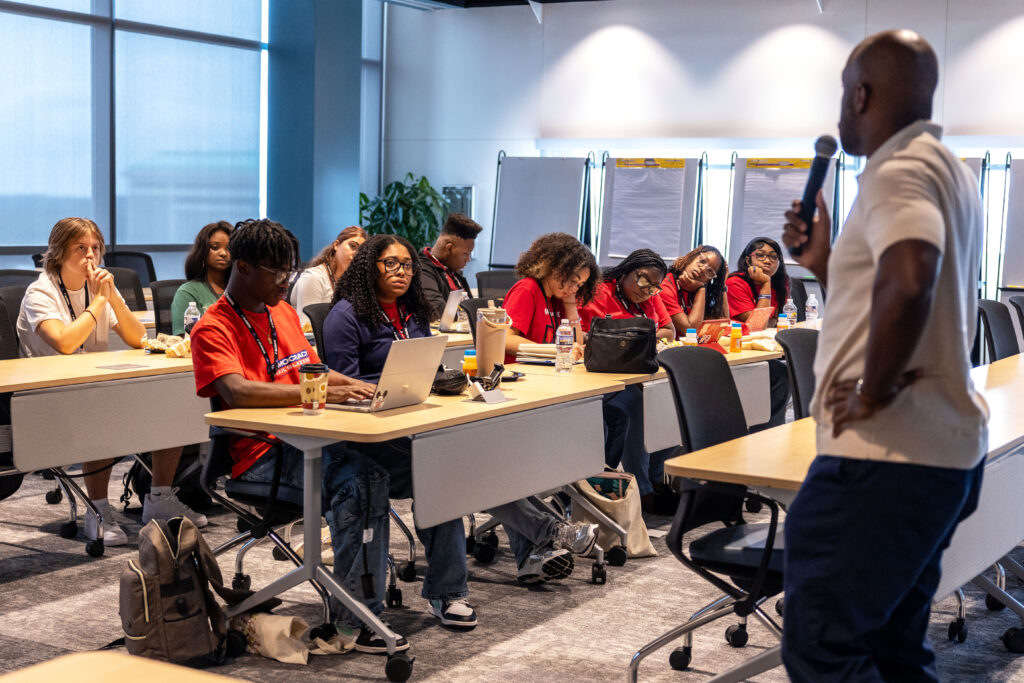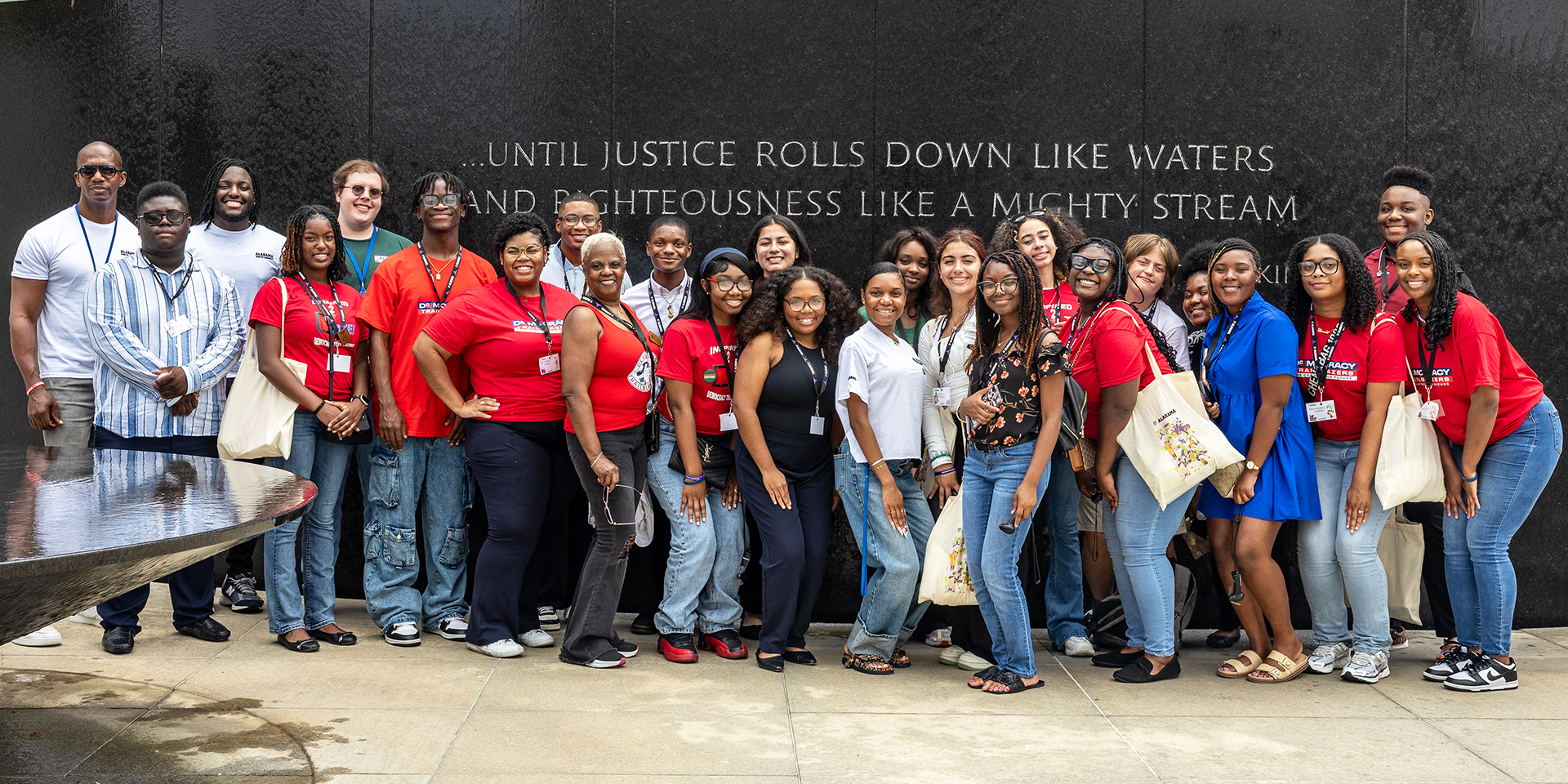Rebecca Solaque was after something she couldn’t quite name. Then she found it this spring — in the Jefferson County branch of the Alabama Youth Council, a group of about 10 high school students that meets biweekly at the Hoover Public Library.
“I was looking for a sense of community,” said Solaque, a 16-year-old high school junior who lives in Hoover, a bedroom community to nearby Birmingham. “That doesn’t necessarily mean the people in your neighborhood or town. I see it as a group of people who believe in something and come together to try to achieve it.”
The idea for the council, one of nine spread across several Alabama counties, sprung from conversations the Southern Poverty Law Center’s Alabama state office organizer Jack Slate had as he traveled statewide, talking with young people about voting.
“As soon as the word vote came out of my mouth, they would turn around and walk away,” Slate said.
So, he changed tack. When Slate met some students in Conecuh, Jefferson and Montgomery counties, he asked them how they felt about having space to set their own priorities, make their own rules and control the agenda. They were intrigued. No one, they told Slate, had ever asked.
“At the SPLC Alabama state office, we’ve been focused on trying to engage with the community in a way that we’re learning more than we’re teaching,” he said. “One thing we learned was that young people don’t really have many outlets to organize here, especially in rural Alabama.”
The youth council’s aim is straightforward: Allow teenagers a democratically organized space where they can meet and discuss issues that matter to them and how they can work together to create the changes they want to see.
“Usually people who are 16, 17 — we don’t have much of a say,” said Spain Park High School senior Akshaya Peddi, vice president of the Jefferson County group. “With the youth council, we’re talking about the things that we want. And that further develops our understanding of how important democracy is.”

It’s an approach that echoes the principle of youth leadership that helped propel the Civil Rights Movement. Young leaders like the Rev. Martin Luther King Jr. — who led the Montgomery Bus Boycott at 26 — and U.S. Rep. John Lewis — who helped orchestrate the 1963 March on Washington at age 23 — built generational coalitions to win passage of the Civil Rights Act of 1965, which marked its 60th anniversary on Aug. 6.
Four days earlier, on Aug. 2, the SPLC hosted youth council members from across the state at its Montgomery headquarters. There they convened with community organizers, policy analysts and fellow members ahead of International Youth Day on Aug. 12.
“When I joined the group, it changed my whole mindset about how to help the community around me,” said Zane Wright, a 16-year-old junior at Jefferson County International Baccalaureate School in Irondale. “It’s really reassuring to know there are a group of people my age that are passionate about helping people and ensuring that the world is a better place.”
These students may not be organizing a national movement, but they are tackling issues that have significance to young people in schools and communities across the country.
Take the committee the Jefferson County council created on ensuring due process for students. That grew out of Wright’s personal experience with a friend who was suspended from school without the benefit of a hearing.
Slate, who attends the group’s council meetings once a month, suggested the council create impact-driven committees, taken up by vote and guided by short and long-term goals. For Wright, who co-chairs the due-process committee, that means standardizing due process rules in his home county in the short term and eventually across the entire state.
Another committee idea, establishing more healthy nutritional standards for school meals, came from Solaque. Last year, she documented the quality of the food she was served at school at her mother’s request, taking a daily photo of each meal.
Solaque expressed concern that school meals — for some students, the only guaranteed meals they would have on a school day — were not always very healthy.
The council’s third priority, making sure schools are more environmentally responsible, came from one council member’s observation after games during the fall football season of how much unrecycled trash her high school marching band produced.
For Wright, who is also a drummer in a school marching band, it was an issue he had seen and contributed to firsthand. The council voted to tackle the environmental issue as the group’s first initiative.
“What makes me most proud of our youth council program isn’t just what we’re offering to young people. It’s what they’re doing with it,” said Slate, the Alabama state organizer. “In Jefferson County, our participants recently took the initiative to apply for and win a grant to fund this community project they envisioned and built from the ground up. That kind of leadership, ownership and vision is exactly what this program is all about — creating space for young people to lead, not just be led.”
While the Jefferson County branch has found a framework that works, there is no standard model that students must follow. If a group thinks a constitution is necessary or helpful, they can create one. If not, no problem. Some youth councils have several members, while others may start with only one. Admission is always open, with membership limited to those age 19 and under.
Slate hopes the flexible nature of the program and the freedom it provides teenagers to come together and pursue their passions will allow the youth council program not only to stand the test of time, but to serve as a model and incubator of youth leadership.
Those who are interested can apply here.
Image at top: The Alabama Youth Council, comprising nine groups across several counties, enables young people to discuss issues that matter to them and collaborate on fostering change in their communities. Pictured, youth council participants and educators visit the Civil Rights Memorial Center in Montgomery on Aug. 2, 2025. (Credit: Josh Carples)



